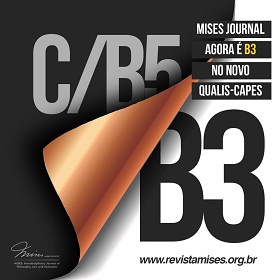Uma análise sobre o tratamento das questões ambientais na tradição da escola austríaca
DOI:
https://doi.org/10.30800/mises.2021.v9.1417Palavras-chave:
escola austríaca, problemas ambientais, subjetivismo, economia ambiental neoclássica, economia ecológicaResumo
O presente trabalho pesquisa o histórico da abordagem da escola austríaca em relação a problemas ambientais, desde o início dessa tradição (1871) até a atualidade (2021). Nessa pesquisa, observa-se que, após muitos anos de considerações apenas superficiais sobre o tema, o artigo Law, Property Rights, and Air Pollution, publicado por Murray Rothbard, em 1982, marcou o início da definição de um paradigma marcadamente austríaco, isto é, baseado na ontologia subjetivista, para os problemas ambientais, no que foi seguido por outros autores, com destaque para Roy Cordato e Graham Dawson. Mais adiante, no entanto, este artigo identifica os problemas que persistem para a formulação coerente dessa abordagem como contraponto à economia ambiental neoclássica e as limitações que sua natureza microanalítica impõe à formulação de um contraponto à economia ecológica.
Downloads
Referências
ANDRADE, Daniel Caixeta; ROMEIRO, Ademar Ribeiro; SIMÕES, Marcelo Silva. From an empty to a full world: a nova natureza da escassez e suas implicações. Economia e Sociedade, v. 21, p. 695-722, 2012.
BARBIERI, Fábio. História do debate do cálculo econômico socialista. Instituto Ludwig von Mises Brasil: São Paulo, 2013.
COSTANZA, R. Ecological economics in 2049: Getting beyond the argument culture to the world we all want. Ecological Economics, v. 168, n. Special Edition, p 1-5, 2020.
COSTANZA, R. What is ecological economics?. Ecological Economics, v. 1, n. 1, p. 1–7, 1989.
CORDATO, Roy E. Global Warming, Kyoto, and Tradeable Emissions Permits: The Myth of Efficient Central Planning. Institute for Research on the Economics of Taxation, 1999.
CORDATO, Roy E. Knowledge problems and the problem of social cost. Journal of the History of Economic Thought, v. 14, n. 2, p. 209-224, 1992b.
CORDATO, Roy E. Market-based environmentalism and the free market: they're not the same. The Independent Review, v. 1, n. 3, p. 371-386, 1997.
CORDATO, Roy E. The impossibility of harming the environment. Ideas on Liberty, v. 52, p. 15-17, 2002.
CORDATO, Roy E. The polluter pays principle: a proper guide for environmental policy. Institute for Research on the Economics of Taxation, 2001.
CORDATO, Roy E. Time passage and the economics of coming to the nuisance: Reassessing the Coasean perspective. Campbell L. Rev., v. 20, p. 273-292, 1998.
CORDATO, Roy E. Toward an Austrian theory of environmental economics. The Quarterly Journal of Austrian Economics, v. 7, n. 1, p. 3-16, 2004.
CORDATO, Roy E. Welfare economics and externalities in an open ended universe: A Modern Austrian Perspective. Springer Science & Business Media: New York, 1992a.
DAWSON, Graham. Austrian economics and climate change. The review of Austrian economics, v. 26, n. 2, p. 183-206, 2013.
DAWSON, Graham. Free markets, property rights and climate change: how to privatize climate policy. Libertarian Papers, v. 3, p. 1-29, 2011.
DAWSON, Graham. Green economics, science and libertarianism. International Journal of Green Economics, v. 9, n. 3-4, p. 316-329, 2015.
DAWSON, Graham. Privatising climate policy. Economic Affairs, v. 29, n. 3, p. 57-62, 2009.
DIETZ, S.; NEUMAYER, E. Weak and strong sustainability in the SEEA: Concepts and measurement. Ecological Economics, v. 61, n. 4, p. 617–626, 2007.
HAYEK, Friedrich. Economics and knowledge, 1937. IN: HAYEK, Friedrich A. Individualism and economic order. University of Chicago Press: Chicago, 1958.
HAYEK, Friedrich. The use of knowledge in society, 1945. IN: HAYEK, Friedrich A. Individualism and economic order. University of Chicago Press: Chicago, 1958.
HAYEK, Friedrich A. Law, Legislation and Liberty Vol. 2: The Mirage of Social Justice, 1976. IN: HAYEK, Friedrich A. Law, Legislation and Liberty. Routledge: London, 1998.
HAYEK, Friedrich A. Law, Legislation and Liberty. The Political Order of a Free People. IN: HAYEK, Friedrich A. Law, Legislation and Liberty. Routledge: London, 1998.
HAYEK, Friedrich A. Os Fundamentos da Liberdade. Visão: São Paulo, 2014.
HAYEK, Friedrich A. The Counter-Revolution of Science: Studies on the Abuse of Reason. The Free Press of Glencoe Collier-Macmillan Limited: London, 1955.
KIRZNER, Israel M. Competição e atividade empresarial. Tradução de Ana Maria Sarda. Instituto Ludwig von Mises Brasil: São Paulo, 2012.
MISES, Ludwig von. Human action. Ludwig von Mises Institute: Auburn, 1998.
ROTHBARD, Murray N. Law, property rights, and air pollution. Ludwig von Mises Institute: Auburn, 2002.
SALERNO, J. Postscript to economic calculation in the socialist commonwealth. In: Mises, Ludwig von. Economic Calculation in the Socialist Commonwealth. Ludwig von Mises Institute: Auburn, 1990.
SMITH, V. K. Environmental Economics. IN: SMELSER, Neil J. et al. (eds.). International encyclopedia of the social & behavioral sciences. Amsterdam: Elsevier, 2001.
SOLOW, R. M. The Economics of Resources or the Resources of Economics. The American Economic Review, v. 64, n. 2, p. 1–14, 1974.
VAUGHN, Karen I. Welfare Economics and Externalities in an Open Ended Universe: A Modern Austrian Perspective by Roy E. Cordato: Reply. Public Choice, v. 77, n. 4, p. 915-917, 1993.
Downloads
Publicado
Como Citar
Edição
Seção
Licença
Copyright (c) 2021 MISES: Interdisciplinary Journal of Philosophy, Law and Economics

Este trabalho está licenciado sob uma licença Creative Commons Attribution 4.0 International License.

Este periódico está licenciado sob uma Creative Commons Attribution 4.0 International License.



















